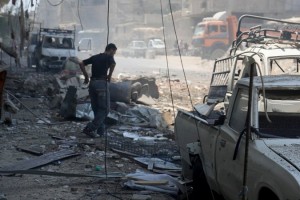The Case for (Finally) Bombing Assad
< < Go Back
The Obama administration wants to reduce the violence and suffering in Syria and, at the same time, quash jihadist groups there. This is why the White House is now pushing a plan for the United States to cooperate with the Russian military in Syria, sharing intelligence and coordinating airstrikes against the Islamic State and the Qaeda-affiliated Nusra Front. In return, Russia would force the government of Syria’s president, Bashar al-Assad, to stop using barrel bombs and air attacks in areas in which neither extremist group is present.
Wiping out terrorist groups in Syria is an important goal and, after years of death and destruction, any agreement among the country’s warring parties or their patrons may seem welcome. But the Obama administration’s plan, opposed by many within the C.I.A., the State Department and the Pentagon, is flawed. Not only would it cement the Assad government’s siege of the opposition-held city Aleppo, it would push terrorist groups and refugees into neighboring Turkey. Instead, the United States must use this opportunity to take a harder line against Mr. Assad and his allies.
Secretary of State John Kerry hopes that this understanding with Russia will help lead to progress on other issues, including restoring the “cessation of hostilities,” a partial truce that began in February and broke down in May, and returning to negotiations on a political transition. These are reasonable goals, which are also embodied in a United Nations Security Council resolution adopted last December.
But a leaked text of the proposed agreement with Russia shows that it is riddled with dangerous loopholes. American and Russian representatives are now delineating areas where the Nusra Front is “concentrated” or “significant” and areas where other opposition groups dominate but “some possible Nusra presence” exists. This will still allow Mr. Assad and his Iranian and Russian backers to attack the non-Nusra opposition in those areas, as well as solidify the Syrian government’s hold on power.
More From The New York Times:




